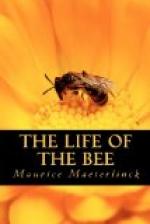assistance. They have the appearance of understanding
each other, and of working for a common aim; and the
observer, therefore, is apt to endow them with reasons
and intellect that they truly are far from possessing.
He will pretend to account for each action, show a
reason behind every movement; and from thence the
gradation is easy to proclaiming them marvels, or
monsters, of innumerable ideas. Whereas the truth
is that these ten thousand individuals, that have
been produced simultaneously, that have lived together,
and undergone metamorphosis at more or less the same
time, cannot fail all to do the same thing, and are
compelled, however slight the sentiment within them,
to adopt common habits, to live in accord and union,
to busy themselves with their dwelling, to return
to it after their journeys,
etc.,
etc.
And on this foundation arise the architecture, the
geometry, the order, the foresight, love of country,—in
a word, the republic; all springing, as we have seen,
from the admiration of the observer.” There
we have our bees explained in a very different fashion.
And if it seem more natural at first, is it not for
the very simple reason that it really explains almost
nothing? I will not allude to the material errors
this chapter contains; I will only ask whether the
mere fact of the bees accepting a common existence,
while doing each other the least possible harm, does
not in itself argue a certain intelligence. And
does not this intelligence appear the more remarkable
to us as we more closely examine the fashion in which
these “ten thousand individuals” avoid
hurting each other, and end by giving assistance?
And further, is this not the history of ourselves;
and does not all that the angry old naturalist says
apply equally to every one of our human societies?
And yet once again: if the bee is indeed to be
credited with none of the feelings or ideas that we
have ascribed to it, shall we not very willingly shift
the ground of our wonder? If we must not admire
the bee, we will then admire nature; the moment must
always come when admiration can be no longer denied
us, nor shall there be loss to us through our having
retreated, or waited.
However these things may be, and without abandoning
this conjecture of ours, that at least has the advantage
of connecting in our mind certain actions that have
evident connection in fact, it is certain that the
bees have far less adoration for the queen herself
than for the infinite future of the race that she
represents. They are not sentimental; and should
one of their number return from work so severely wounded
as to be held incapable of further service, they will
ruthlessly expel her from the hive. And yet it
cannot be said that they are altogether incapable
of a kind of personal attachment towards their mother.
They will recognise her from among all. Even
when she is old, crippled, and wretched, the sentinels
at the door will never allow another queen to enter
the hive, though she be young and fruitful. It
is true that this is one of the fundamental principles
of their polity, and never relaxed except at times
of abundant honey, in favour of some foreign worker
who shall be well laden with food.




